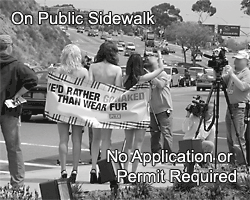
Does the Public Have a Right to Use a Shopping Center as a Public Forum?
While the US Supreme Court has decided that the First Amendment does not protect a right to speak on privately-owned shopping centers. The California Supreme Court has decided that the state constiution does does protect a right to speak on privately-owned shopping center. The scope of the state constitutional protection of speech on privately-owned shopping centers changes as the California appellate courts look an new issues and revist old ones. In Decemeber 2012, the California Supreme Court concluded that the state constitution only protects speech on the public forum areas, meaning that the owners/managers are free to close the utilitarian areas to public forum uses.
Does a Shopping Center Need to Adopt Rules Regulating the Use of the Common Areas as a Public Forum?
With rare exceptions, the people using shopping centers as a public forum claim that the public has unrestricted rights. These claims ignore the cases permitting shopping centers to regulate the use of its common areas as a public forum. However, the shopping center must first adopt appropriate rules for regulating public forum uses, and, unless the “speaker” is physically obstructing or intimidating customers or employees, shopping centers cannot rely on the California criminal trespass laws and citizen arrests to regulate public forum uses.
Regulating the Use of the Common Areas as a Public Forum
The key is adopting appropriate rules. With appropriate rules, a shopping center can use an application and permit procedure to prevent unregulated public forum uses by unknown persons, and use the civil trespass laws to prevent such uses. The shopping center can prohibit grisly and gruesome displays, clear walkways, stairs, and escalators, and keep incompatible sensationalism on the public sidewalk.
Mr. Lines can draft enforceable rules regulating the use of the shopping center as a public forum. Mr. Lines can draft an enforceable application and permit procedure, educate staff on the use of application and permit procedure, and handle the litigation needed to enforce the rules and application and permit procedure.
Mr. Lines can provide a basic set of rules, etc., for smaller shopping centers, and a complete set for larger centers. The cost of providing the basic set of rules and educating staff on the use of the basic application and permit procedure can be as little as $750.00 per shopping center.
Mr. Lines has substantial experience in drafting rules regulating public forum uses and in enforcing shopping centers use of such rules. Mr. Lines has drafted rules for Westfield, Macerich, RREEF, and Simon Properties. In Union of Needletrades, etc. v Superior Court (1997) 56 Cal.App.4th 996, the Second District Court of Appeal approved the use of regulations and an application and permit procedure drafted by Mr. Lines.
Mr. Lines represented Fashion Valley Shopping Center in Fashion Valley Mall v. NLRB (2007) 42 Cal.4th 850. This is the California Supreme Court case that approved a shopping center’s right to prohibit the immediate solicitation of funds.
Mr. Lines can provide experienced advice on all of the following subjects:
Which developments — shopping centers vs. single retail stores, retail area in office buildings, medical or other offices, industrial, multi-unit residential
What locations — public froum areas vs. utilitarian areas (entrances/existis. storefronts and product displays, sidewalks and corridors, stairs/escalators, , parking areas, fire lanes)
What promotional devices — tables, chairs, loudspeakers, leaflets, banners and signs, signs on poles, offensive graphic displays, musical instruments
What speakers — public service educators, labor unions, protestors, candidates for public office, voter registrars, solicitors for signatures supporting petition, fund raisers, Girl Scouts and Salvation Army
Lease issues — Landlord’s compliance with obligations to operate and manage common areas, reimbursement for legal fees as common area maintenance expense, and Tenants’ obligations to cooperate
Civil trespass issues — scope, notices, self-help procedure, and enforcement
Criminal trespass issues — case law/statutes constraints, procedure for citizens’ arrest, law enforcement support, false imprisonment and arrest liability, insurance coverage for indemnity and defense
